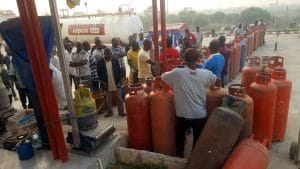I
Ikenna Ngere
Guest

A recent report from the National Bureau of Statistics (NBS) reveals that residents of nine Nigerian states spent a total of ₦312.27 billion on Liquefied Petroleum Gas (LPG), commonly known as cooking gas.
This figure was highlighted in the 2024 Nigeria Residential Energy Demand-Side Survey, released on Wednesday, which examines the country’s shifting energy consumption patterns.
The report, based on data from 7,706 households across Akwa Ibom, Bauchi, Ekiti, Enugu, Kano, Kwara, Oyo, Plateau, and Sokoto states, offers detailed insights into how Nigerians use LPG, fuelwood, charcoal, electricity, and other energy sources for cooking and heating.
Conducted between April 19 and May 5, 2024, the survey used systematic sampling to gather its findings, capturing household energy use and expenditure over the preceding 30 days.
According to the report, 19.4% of households used LPG during this period, with the average household expenditure on LPG recorded at ₦10,239.70.
State-by-State Expenditure
Sokoto led in LPG expenditure, with residents spending an average of ₦12,439.30 per month, followed by Enugu at ₦11,852.20.
Ekiti had the lowest monthly expenditure, averaging ₦8,213.50. Despite these figures, some states, such as Bauchi, showed limited adoption of LPG, with only 0.8% of households using the fuel.
Most households (39%) reported obtaining LPG from vendors using a cylinder-to-cylinder model, while 34.2% purchased from filling stations and 26.8% from standalone gas refilling plants.
Traditional Fuels Still Dominate
Despite the rise in LPG usage, traditional fuels such as fuelwood remain prevalent. The survey shows that 67.8% of households rely on fuelwood for cooking, domestic, agricultural, and commercial purposes. Bauchi and Sokoto states were particularly reliant on fuelwood, though only 1.7% of households reported selling it.
Annual spending on fuelwood is estimated at ₦608.72 billion, with the average household spending ₦117,347 annually.
Charcoal is another common fuel source, with 22% of households using it primarily for cooking. However, charcoal production is limited, with only 0.3% of households engaged in its production, mainly in Kwara and Ekiti states.
Electricity and Energy Access
Electricity access remains a critical aspect of household energy use. Approximately 58.2% of surveyed households are connected to the national grid, with Ekiti leading the pack at 79.7%.
However, most of these households (85.2%) are still billed on an estimated basis, while only 14.8% use prepaid meters.
Solar power is also emerging as a viable alternative, with 4.8% of households reporting access to solar home systems or mini-grids.
Additionally, 4.8% of households use diesel or petrol generators, purchasing an average of 7.38 litres of fuel per month, with 86.7% of the purchases made at filling stations.
The post Residents Of Nine States Spend ₦312.27 Billion On Cooking Gas – NBS Report appeared first on Naija News.
